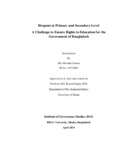| dc.contributor.advisor | Haque, Professor Md. Reazul | |
| dc.contributor.author | Zaman, Md. Mostafa | |
| dc.date.accessioned | 2016-01-20T14:56:32Z | |
| dc.date.available | 2016-01-20T14:56:32Z | |
| dc.date.copyright | 2014 | |
| dc.date.issued | 2014-04 | |
| dc.identifier.other | ID 13372005 | |
| dc.identifier.uri | http://hdl.handle.net/10361/4909 | |
| dc.description | This thesis is submitted in partial fulfillment of the requirements for the degree of Masters of Arts in Governance and Development, 2014. | en_US |
| dc.description | Cataloged from PDF version of thesis report. | |
| dc.description | Includes bibliographical references (page 50). | |
| dc.description.abstract | Education is the fundamental right to every citizen. The affiliation between
education and poverty is spherical. The lack of education forces the poor household
to engage in less productive activities which results in poverty. Poverty leads to low
investment in education. As a developing country Bangladesh has many challenges
to meet. There is obligation to fulfill the basic requirements of the citizen. Education
is the core issue of all developments. Without it a nation cannot get forward
movement. In this research, the issue of development and right to education have
been analyzed with recommendations. It covers present context of education,
development of education in last four decades, state of governance, the role of NGOs
and the international development partners as well. Both rural and urban perspectives
were focused on dropout. Gender issues have also been emphasized here. Role of the
government has been discussed critically. In the study qualitative method has been
used. Due to limitation of time and scope quantitative method has not been chosen.
During research both primary and secondary sources of data have been used. The
primary data have been collected from the study areas and the secondary ones from
different relevant publications, dissertations, books, journal articles, reports,
government publications, existing rules and regulations, different acts and websites.
The methods of interview as designed are on the Semi-Structured Questionnaire
FGD and Case Study. Right to education of all the citizens is a concern and to that
end the National Plan for Action (NPA) and the National Education Plan (NEP) have
special dimension in the research. The major findings of the study are- ensure quality
education for the people who are engaged to less productive jobs, mismanagement of
government allocations, impact of poverty and social decay like drug abuses. The
recommendations made on different issues are mainly on minimizing poverty gaps,
child-friendly teaching methods, process of teacher recruitment and looking for ways
for universal primary education in Bangladesh. Hopefully the research will put a
significant contribution to the field of knowledge. | en_US |
| dc.description.statementofresponsibility | Md. Mostafa Zaman | |
| dc.format.extent | 50 pages | |
| dc.language.iso | en | en_US |
| dc.publisher | BRAC University | en_US |
| dc.rights | BRAC University dissertation are protected by copyright. They may be viewed from this source for any purpose, but reproduction or distribution in any format is prohibited without written permission. | |
| dc.subject | BIGD | en_US |
| dc.subject | MAGD | en_US |
| dc.title | Dropout at primary and secondary level : a challenge to ensure rights to education for the Government of Bangladesh | en_US |
| dc.type | Thesis | en_US |
| dc.contributor.department | BIGD, BRAC University | |
| dc.description.degree | M. Governance and Development | |

